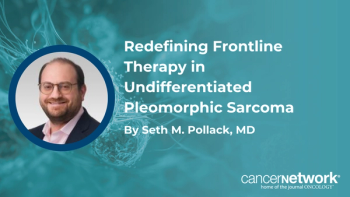
Looking Ahead and Key Takeaways in EGFRm NSCLC
Panelists discuss how overcoming resistance mechanisms in EGFR-mutated non–small cell lung cancer (NSCLC) remains a key unmet need, with future research focusing on targeting these mechanisms, exploring new drug combinations, and optimizing treatment sequences to improve patient outcomes.
Episodes in this series

Video content above is prompted by the following:
Key Takeaways
Resistance Mechanisms and Challenges
Despite significant progress in the treatment of EGFR-mutated non–small cell lung cancer (NSCLC), the issue of resistance remains a primary concern. Clinicians are dealing with challenges such as identifying mechanisms of resistance that are not always easily detected, even with molecular testing.
Continued research is essential to understand and address the evolving mechanisms of resistance, particularly in patients who progress after initial treatments. This includes the potential for adding therapies after progression or combining treatments.
Emerging Clinical Trials and New Combinations
Several clinical trials, such as the SAVANNAH and ORCHARD trials, are investigating new treatment regimens and drug combinations. These efforts are crucial to improve outcomes in EGFR-mutated NSCLC and explore more effective ways to address resistance.
Third-generation EGFR inhibitors and other novel therapies are being tested, offering hope for improved patient outcomes in the future.
Treatment Strategies and Sequencing
In practice, clinicians must make decisions based on the available evidence, even as the field evolves. For example, current first-line treatments such as MARIPOSA-2 are important, but questions remain about how best to treat patients after progression.
Chemotherapy remains a key part of the treatment sequence for some patients. Clinicians may prefer regimens such as pemetrexed and platinum combinations, potentially in addition to other therapies.
Improvements in Overall Survival
There has been significant progress in improving overall survival (OS) with the use of EGFR-targeted therapies. For example, findings from recent studies show a 25% improvement in survival with the current regimens.
The use of the best therapies up-front remains critical. The emphasis is on ensuring that patients receive optimal treatment at the beginning of their therapy journey to maximize progression-free survival and OS.
Global Variability and Moving Treatment Earlier
Treatment approaches may vary globally, as seen in regions such as Japan, where a higher percentage of patients with lung cancer have EGFR mutations compared with those in the US.
As more data emerge, there is increasing interest in moving EGFR-targeted therapies into earlier stages of treatment, which may further improve patient outcomes.
Learning Curve and Implementation
Although progress is being made, there is still a learning curve in implementing the most effective treatment regimens and managing patients in real-world clinical settings.
Clinicians need to be prepared for ongoing developments in the field as new treatments and resistance mechanisms continue to evolve.
Unmet Needs and Future Research Directions
- Resistance understanding: There remains a significant gap in fully understanding the mechanisms behind resistance to EGFR inhibitors. Continued research into biomarkers and resistance pathways is essential for improving treatment strategies.
- Improving access to therapies: Ensuring that the best therapies reach as many patients as possible is critical, especially as new drugs and regimens are developed.
- Optimizing treatment sequencing: The sequencing of therapies, including when to introduce chemotherapy or other agents after resistance, needs further exploration.
- Global treatment strategies: Addressing regional differences in patient populations and treatment approaches will be key in refining treatment strategies for EGFR-mutated NSCLC on a global scale.
Conclusion
Physicians should be aware of the ongoing advances in EGFR-targeted therapies for NSCLC and the importance of staying updated on new clinical trials, emerging resistance mechanisms, and treatment regimens. With significant progress being made in improving patient outcomes, there is an ongoing need for research and adaptation in clinical practice to ensure optimal care for patients with EGFR-mutated NSCLC.
Newsletter
Stay up to date on recent advances in the multidisciplinary approach to cancer.












































